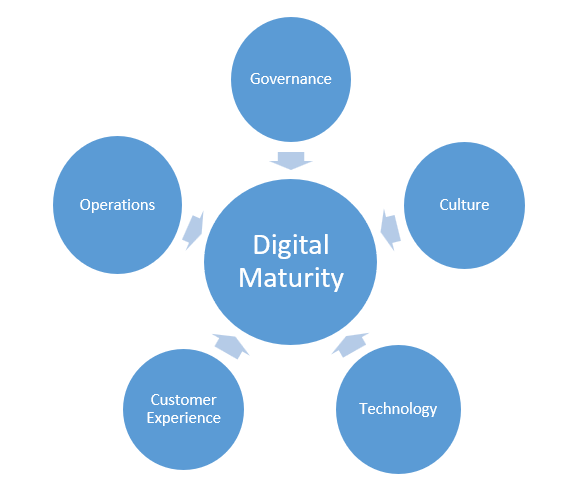A digital organization is an entity that has fully integrated technology into its business operations, strategies, and culture. It leverages digital technologies to optimize its processes, improve communication, enhance customer experience, and gain a competitive advantage.
A digital organization may use a variety of technologies, such as cloud computing, big data analytics, artificial intelligence, machine learning, and the internet of things (IoT) to transform its business processes. It also promotes a digital culture that embraces innovation, collaboration, and continuous learning.
Digital organizations often have a flat organizational structure that encourages cross-functional teams and open communication channels. They prioritize agility and speed over rigid hierarchies and bureaucracy, enabling them to respond quickly to changing market conditions and customer needs.
Take the Survey
Digital Maturity refers to an organization's ability to quickly respond to the developments and shifting trends of technology. The focus is on creating value through these new capabilities and consumer interests fast enough to have a competitive advantage over rivals. Digital Maturity requires investment in the tools and human resources that can best leverage new technology.
A digital maturity model is a framework that provides a structured approach to evaluating and enhancing an organization's digital capabilities and readiness. It is used to evaluate an organization's ability to adopt and leverage digital technologies and processes to drive business value and innovation.
Digital maturity models typically consist of a set of stages or levels that describe an organization's digital maturity, ranging from a basic level of digital capability to a highly advanced level. These stages may include factors such as an organization's digital governance, culture, operations, technology infrastructure, and customer expectations.
Using a digital maturity model, organizations can identify areas where they can improve their digital capabilities, prioritize investments in digital initiatives, and benchmark their digital maturity against industry peers. This can help organizations to stay competitive, meet changing customer needs, and drive innovation in a rapidly evolving digital landscape.
Within the scope of the test, you will evaluate your company according to your own perspective by answering questions related to the governance, culture, technology, customer experience, and operations criteria
As the evaluation results are shaped by personal opinions, they are predictive in nature and do not carry feasibility qualities. It is recommended that you obtain professional consulting services after the self-assessment to access detailed and unit-based results related to your company.
The questions you will answer are classified according to a 5-point Likert scale. You are expected to choose the most appropriate definition for your company from the descriptions below.
Non-existent: If your company is at the Non-existent level, no study or planning has been done at the executive level regarding the specific question.
Initial: If your company is at the Initial level, it is starting to consider becoming a digital company but hasn't yet implemented any formal initiatives in this regard.
Encouraged: Your company has taken steps towards becoming a digital company by initiating efforts related to a specific question. The Encouraged level suggests that management support is in place and particular departments have implemented necessary actions.
Practiced: If your company is at the Practiced level, significant efforts have been made regarding this question, and essential practices have been implemented. Managers and employees have reached a consensus on the path toward becoming a digital company.
Managed: If your company is at the Managed level, all the activities related to the evaluated question have been successfully implemented. At this level, the company has taken the necessary steps to become a digital company, planned its strategies and investments accordingly, and effectively executed digital applications across all its departments.
Take the Survey
Project Coordinator: Dr. Sara SABERI (Worcester Polytechnic Institute - Business School)
Pos-Doc Fellow: Dr. Abdullah YILDIZBASI (Worcester Polytechnic Institute - Business School)
Post-Doc Fellow: Dr. Abbas MARDANI (Worcester Polytechnic Institute - Business School)

